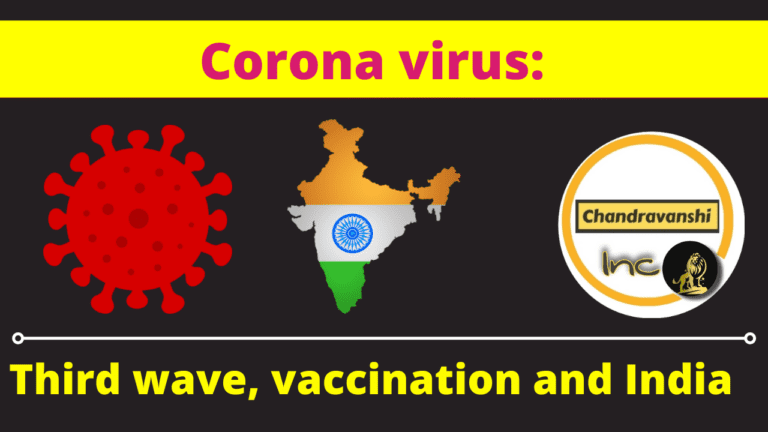India on top of the transition chart: Policy, Ethics, Politics & Corona
India on top of the transition chart: policy, ethics, politics and corona
The figures of Covid infected are absolutely frightening. The intensity of the second wave of Covid is being reflected in the data. India once again tops the transition chart.
On Wednesday, 1.8 lakh new cases of Covid-19 infection and more than 900 deaths were recorded in the country, i.e. more than a hundred new cases per minute and one death every two minutes.
Some epidemiologists estimate that the number of daily cases could triple by mid-May at the rate at which cases are increasing and the death toll could cross 2,000 per day.
The scenario that emerges from across the country shows several levels of failure in terms of policy, political and personal behaviour.
Most importantly, it is showing contextual lapses – collective accountability collapsed across states, prudence in quarantine and active public policy in lockdown. The matter is very delicate. Since February, India and Indians seem to have entered a phase of the pandemic where they rely only on destiny. S
ome began to believe in being extraordinary, something like immortality among the clear evidence of death. Like the Yaksha question of Mahabharata. People’s behaviour is influenced by important people in power and sadly the ‘all is well’ attitude of the political class encourages irresponsibility.
The failure of those in power deepens the tragedy. On Saturday, the Election Commission asked political parties to strictly follow the COVID-19 guidelines issued by it last year.
Should the Election Commission be reminded to follow the guidelines issued in 2020, six weeks after the start of the campaigning and voting process, it shows the state of negligence.
Couldn’t TN Seshan’s successor have done something better?
Surely, things like limiting the number of rallies, limiting the crowd in rallies and insisting on wearing masks can be done. Images and videos of huge crowds at rallies show signs of the rapid spread of infection and what can be done.
Every political party at the Center and in the states is responsible for how the pandemic is being managed or mismanaged. The question arises that how so many of his rallies were suitable for Covid. In an election state, a senior minister even argued against wearing a mask!
Sadly, those who are in power and can influence people do not set an example – just imagine, what would be the power of that message, if people were asked to wear masks and behave appropriately at the beginning of every rally.
To be reminded! Certainly, those pushing the political narrative to achieve a practical and some favourable goal may argue the opposite of messages and boundaries, but the question arises as to why this is not the case. On one hand, a High Court has said that everyone must wear masks, even if one is sitting alone in the car.
On the other hand, thousands of people are gathering without masks in rallies. Is a political rally specific to the virus or is it immune! And if there can be a limit for weddings and funerals, why not for political rallies?
It is very easy to put all the blame on political parties and governments. And indeed politicians and their regimes have much to answer for. It is equally important to ask whether governments alone are to blame. The increasing number of cases and deaths are largely due to the careless behaviour of the public.
Social distancing in India has always been challenging given the poverty and density of the population. But what can be said about the lax attitude towards wearing masks for protection? One, people do not wear masks, even if they do wear masks, they use them as a fashion.
There is some truth about Covid – being unable to do normal things can weigh on the mind. But this cannot be an excuse to put lives at risk. A WhatsApp message clarified the mood – “Only one in a million can win the lottery, but this is not the case with infections.”
It is a difficult task to strike a balance between life and livelihood in the time of the pandemic. Yes, governments have opened up markets, but economic engagement cannot deliver freedom from individual and collective responsibility.
Did the resourceful use the power to set an example to inform the underprivileged – did public transport insist on wearing masks in buildings, lifts, shops, markets and elevators?
Although many people have done so, the general tendency is to ignore it. And this neglect has harmed both life and livelihood. William Foster Lloyd and Garrett Hardin put forward the idea of how individuals act in their own interests and against the public good.
He portrayed it as the tragedy of the common man. Individual behaviour in the Indian context defies both self and public interest. The landscape of this pandemic is littered with the known and the unknown.
As Nobel laureate and behavioural science expert Daniel Kahneman put it, we think of the future in terms of anticipatory memories—we imagine what we would remember in a normal situation.
It is only natural to expect normalcy to be restored every time the wave weakens, but it is a grave mistake to be careless and to abandon caution. The pandemic demands eternal vigilance and it is an unequal contest of chance – the virus needs just one chance.




